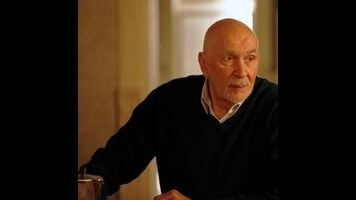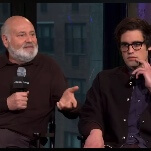The theme park that was opened as EPCOT Center in 1982 traces its roots back to the ’60s, when Walt Disney became preoccupied with the idea of planning a community using the same techniques he and his Imagineers had applied to the creation of Disneyland. Taking shape during the final years of Disney’s life, the Experimental Prototype Community Of Tomorrow (abbreviated as EPCOT; sometimes “city” was used instead of “community”) was a utopian vision for the urban future, a master plan for the “great, big, beautiful tomorrow” Disney promised at 1964-65 New York World’s Fair. In one of his final onscreen appearances, Uncle Walt pitched the project directly to lawmakers in Florida, where the Disney company was busy buying up huge tracts of land under the guise of multiple dummy corporations.
Tomorrow never came. Disney died in 1966, and construction on the so-called “Florida Project” commenced in the years that followed. The park, officially deemed Walt Disney World to honor the late entertainer and entrepreneur, took the form of a sequel to his Disneyland: an attempt to top its predecessor in every way. The EPCOT concept, meanwhile, was rejiggered into the “permanent world’s fair” that we now know as the down-styled Epcot, with its geodesic golf ball, its internationally themed pavilions, and Twitter parody account.
In 1983, Epcot represents to the Jennings what it represented to Disney in 1966: Safe haven. Had things gone according to plan, Philip, Elizabeth, and Paige would be waiting for Henry to disembark from his 17th ride on Spaceship Earth while Pastor Tim and Alice meet their untimely, KGB-orchestrated death. But since “Experimental Prototype City Of Tomorrow” is a cliffhanger episode of an intricately arranged TV thriller, there’s a change of plans at the 11th hour. Philip and Elizabeth discover a glanders-stricken Gabriel at the safe house, which means they’ve also been exposed to The Bioweapon That Wouldn’t Leave. After signaling William—and exposing him to the virus via snicker snag—they receive an antidote and the news that the whole Soviet quartet is under quarantine for 36 hours. Cue Philip Jennings, whose Grizzly Adams sleeping bag must be just out of the shot: “Guess we’re not going to Epcot.” It’s probably for the best: Remember what happened the last time the Jennings went to an amusement park?
But “Experimental Prototype City Of Tomorrow” is more than its last eight minutes. It’s also The Americans episode that gives the most serious consideration to extracting the Jennings from Falls Church. Escape is represented throughout, from the spur-of-the-moment family vacation to Elizabeth’s daydream of life on the Black Sea’s shores to Gabriel’s gasped words to his two charges: “Get out, get out. Get out!” This is usually Philip’s drum to beat, but Gabriel’s pounding out John Bonham solos on it this week, advocating for “other ways” of dealing with the Pastor Tim problem before telling Claudia “It’s time to take them home.” But does he mean that literally or figuratively? The Jennings’ meeting with Pastor Tim gets the euphemistic double talk going early in the episode, so The Centre might not be so interested in letting its agents see Russia again.
The Jennings’ ability or inability to escape (quarantine notwithstanding) remains theoretical, but tonight’s episode spends a few brief moments with someone for whom there is no escape: In a pair of impressionistic scenes, “Experimental Prototype City Of Tomorrow” catches up with Nina, who’s back in the gulag after attempting to contact Baklanov’s son. The meeting with her lawyer sheds the Soviet justice system in extremely Kafkaesque light: She’s already been found guilty, and the court is determining whether or not her crimes qualify for “exceptional punishment.” (Euphemisms again—we’re to understand that “exceptional” is synonymous with “capital,” right?) There’s a chance to appeal, but the only glimmer of hope in the dimly lit, occasionally-shot-from-above scene comes from Baklanov’s statement, in which he says he had no knowledge of Nina’s illegal correspondence. That’s what we hear from the lawyer, anyway: Nina reads the statement in silence, and the camera slowly pushes in on Annet Mahendru, catching the motion of her eyes and the hint of a smile that spreads across her face.
It’s a moment that connects Nina to the Jennings women, who each get an interlude that ends in a similar fashion: Elizabeth at the Mary Kay meeting, and Paige while she’s watching Henry play Space Cadet on the new family PC. These are scenes of dawning realizations, of reflection and observation between the action. Nina, recognizing that her actions won’t harm Anton. Elizabeth, identifying a potential in with fellow Mary Kay sales rep Young-hee (Ruthie Ann Miles). Paige, uncertain if her parents are out there hurting people (“Paige, you know us better than that.” “I don’t know what I know”), but content in a few seconds of at-home security. It’s her personal EPCOT/Odessa moment.
So what to make of Nina’s dream, which pulls Stan out of the FBI corridors and away from his mounting suspicions and returns him to the old safe house? Filled with sunlight and flowers, there’s a romantic atmosphere—but also one of death. (The room, like a cinematic vision of heaven. The bouquets, arranged like those at a funeral home.) In line with the cliffhanger structure of the episode, the act breaks before anything is resolved. It resembles Paige’s scene at the dinner table, which plays out like an inhale without the corresponding exhale. She looks up from her homework, watches Henry play his computer game, smiles, fiddles with her hands as if she’s about to say something—and then the episode cuts from the dining room to William’s red biohazard bag.
The unspoken, nonlethal terror of tonight’s cliffhanger: How it leaves Paige and Henry hanging. Elizabeth and Philip have stranded their kids due to work before (remember the hitchhiking adventure from season one?) but not for 36 hours. They’ll be alone for all that time, and Paige could make an educated guess as to why they’re alone, but she’ll have to keep it from her brother. Meanwhile, the wheels are ostensibly in motion to bump off Pastor Tim and Alice, meaning the news of their deaths could reach Paige while she’s still at home.
The original plan for the Experimental Prototype Community of Tomorrow called for a climate-controlled enclosure that would protect the urban center—with its 30-story hotel, retail shops, theater district, nightlife spots, restaurants and offices—“day and night, from rain, heat and cold, and humidity.” Residents and visitors would come and go as they please, but Disney’s presentation film depicts this part of EPCOT as a metropolis under glass, sealed those inside off from exposure to the outside elements—and vice versa.
It’s given a cheery sales pitch, but it sounds an awful lot like a quarantine. Philip Jennings is wrong: If he looks at the next 36 hours from a different angle, he and Elizabeth do get to go to Epcot.
Stray observations
- The Americans Wig Report: Season Four, Week Three: B+. Elizabeth’s commitment to her Mary Kay persona, Cindy, comes through in Cindy’s wig, which screams “fun but professional.” Plus it gives her a chance to show off those amazing geometric earrings!
- Was there any Mail Robot: Not only does Mail Robot visit “Experimental Prototype City Of Tomorrow,” but for a split second, it sounds like Aderholt is reading a memo that was composed by Mail Robot. If Mail Robot cannot, as we humans say, “feel” anything, then neither can an intelligence agency.
- In the wake of last week’s “Tainted Love” sequence, the mere sight of Martha’s bus had the hairs on the back of my neck standing up.
























![HBO teases new Euphoria, Larry David, and much more in 2026 sizzle reel [Updated]](https://img.pastemagazine.com/wp-content/avuploads/2025/12/12100344/MixCollage-12-Dec-2025-09-56-AM-9137.jpg)
















